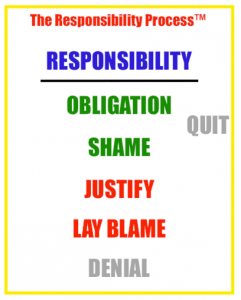Introducing Kanban into your team or organization does not merely transform the way you manage work. It also impacts how you, collectively as a team, look at work.
The big leap forward happens when team members start to think of their work as a system, instead of seeing it as a group of individual tasks. Then a Kanban team is born, and the real power of Kanban is unleashed. Team members start to talk about flow and bottlenecks and how to restructure their workflow to improve performance. Ultimately they engage in an endless loop of improvement.
Another specific characteristic of the Kanban Team is shared responsibility. In contrast to traditional work management approaches, where the manager is the only one responsible, who needs to push work forward, in Kanban, team members have shared ownership of the process. Being co-owners of the workflow, they are empowered to contribute to problem-solving and improving work systems. For that to happen, though, first, all team members have to think and act from the responsibility state.
The Responsibility Process
Before going into what the responsibility state is, let me start by sharing my absolute admiration for Christopher Avery and his work. If I named one thing that changed my life completely, I wouldn't hesitate for a second - undoubtedly, it is the Responsibility Process.

I would recommend that you hear Christopher himself explaining it, but if you are curious to get a quick walk-through, here it is:
Generally, the responsibility process starts when something bad happens. Depending on your character and inner self, you fall into one of the process steps and usually go up the ladder (unfortunately, this is not guaranteed).
Some people initially fall into DENIAL and later move on to RESPONSIBILITY. Others get stuck with JUSTIFY for their entire lives.
To clarify things, let's imagine the following situation: Your spouse wakes up in the morning. Dresses up for work and goes out through the door, only to find out that it was left unlocked the whole night, exposing you and your family to risk of being robbed. They are 100% sure that you were the last to come home, and therefore you were the one who should have locked the door.
Then they ask you: Why didn't you lock the door last night? If you are the DENIAL type of guy, you would first think (or say):
"It wasn't me!"
Denial is the lowest step on the ladder - you deny the issue. You couldn't have done something so stupid, and you ignore the fact that theoretically, it could have been you.
Moreover, you tend to blame others for something that you might have done:
"It was you!" (you lay blame at your spouse)
With the help of a few witnesses (your children), it becomes evident that it was indeed you who came home last, and therefore it was you who messed up. What would your reaction be then?
"I was fetching you guys dinner, and I had two bags in my hands, and I could not lock the door." (you justify)
Yeah, tell us a good story why things are the way they are, and we will believe you. Thanks, but does this change the fact that your family was at risk? No! And that is why you might feel ashamed:
"How could I be so distracted?" (you feel shame)
Shame is a natural feeling in a situation like that, but is it the desired state of mind? No! Especially if you keep forgetting to lock the door.
After being threatened by your spouse that they would leave you if you didn't change your behavior, you start locking the door diligently every night. You curse about it, but you do it because you were issued an ultimatum.
"I have to, but I don't want to." (you feel obligated)
Thinking like that puts your brain in prison. If you do things that you don't want to but have to, you are probably not happy. If you get very, very unhappy, you reach the state where you stop caring, and you would go with the flow. Your body would be doing things, but your mind would be floating someplace nicer where it wouldn't feel so much pain. You will mind-quit.
The sad reality? Most people hate their jobs, and yet they go to the office every morning. Does it have to be like that? Of course not!
The Responsibility State
The last step of the Responsibility Process is the Responsibility state. Here is where you actually solve problems and aim to further progress. If you install a new automatic lock, you will have an excellent solution to the problem, and it will never bug you again.
If you find a thrilling goal in your work or even change your job, you will feel better.
Unfortunately, not many people tend to go to responsibility fast. They usually linger between states, and only a small group manages to climb the stairs. The reality is, however, that Responsibility is the only state of mind where progress happens.
Alright, So Why Is Responsibility the Engine of the Kanban Team?
Lean is all about eliminating waste. For experienced lean practitioners, this is a no-brainer. Logically, all techniques and processes that come along are oriented at removing some waste. By doing that, we are solving surface issues and improving our system.
The thing is that ongoing improvement is only possible when all parties come from the perspective of "Responsibility". In this sense, the reaction to issues should be asking themselves the question "What can I do to make things just a little bit better?".
When team members intuitively act from the responsibility state, this eliminates another process waste - time wasted in denying, blaming others, or justifying mistakes, instead of solving issues. Reducing this to a minimum empowers your Kanban team to better collaborate and share knowledge in seeking solutions to different challenges. Eventually, this results in the creation of a culture of continuous improvement.

The Responsibility Process in Lean
As shown in the diagram above, acting out of responsibility is at the core of the Kaizen culture. If you want to embrace lean, try mastering the responsibility process first. It's a non-sufficient but necessary condition.

Dimitar Karaivanov
CEO and Co-founder of Businessmap
Dimitar is a lean thinker and a Kanban practitioner with a solid background in the areas of software development and process improvement. He is passionate about achieving extreme performance at scale and applying Lean/Agile principles outside IT.



